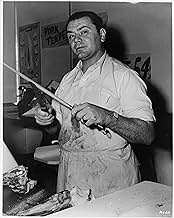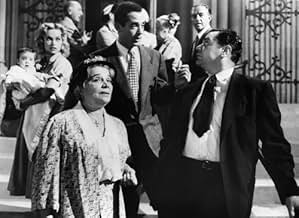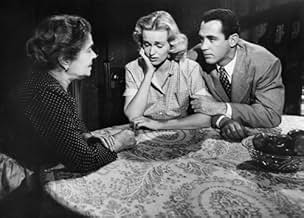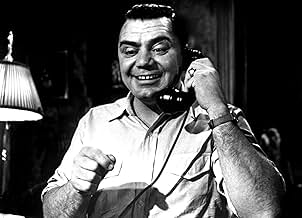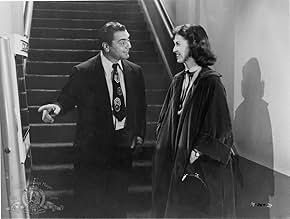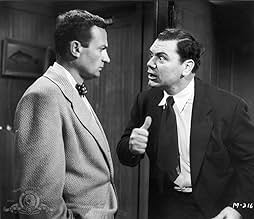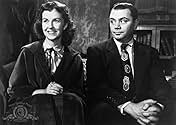CALIFICACIÓN DE IMDb
7.7/10
29 k
TU CALIFICACIÓN
Un carnicero de mediana edad y una profesora que han renunciado a la idea del amor se encuentran en un baile y se enamoran.Un carnicero de mediana edad y una profesora que han renunciado a la idea del amor se encuentran en un baile y se enamoran.Un carnicero de mediana edad y una profesora que han renunciado a la idea del amor se encuentran en un baile y se enamoran.
- Ganó 4 premios Óscar
- 19 premios ganados y 6 nominaciones en total
James Bell
- Mr. Snyder
- (sin créditos)
Joe Bell
- Undetermined Secondary Role
- (sin créditos)
John Beradino
- Man in Bar
- (sin créditos)
Chad Dee Block
- Dance Hall Patron
- (sin créditos)
Norman Borine
- Dance Hall Patron
- (sin créditos)
Nick Brkich
- Bachelor
- (sin créditos)
Brad Brown
- Club Patron
- (sin créditos)
Marvin Bryan
- Herbie
- (sin créditos)
Charles Cane
- Lou
- (sin créditos)
Paddy Chayefsky
- Leo
- (sin créditos)
Bud Cokes
- Club Worker
- (sin créditos)
Opiniones destacadas
Marty, starring Ernest Borgnine and Betsy Blair, is a touching story from the 1950's about two people who fall in love and want to be together. However, they come up against the gossip, social pressure, and expectations of family and friends that hold them back from their natural instinct to marry and love one another. Both are "older" by the standards of the time but that does not stop them from wanting someone special. They are both excited about the prospect of spending their lives together and then, there is a pause as the elation runs up against reality. Borgnine and Blair are excellent in the role of a young couple who desire to break away from the bonds of friends and family to form their own home life. How will it turn out? This movie is a departure from the glossy Hollywood movies of the 1950's that used colour and celebrity talent and lacked the realism and honesty of this classic. Marty was a more mature movie, with a more effective treatment of social divisions and complicated relationships. Paddy Chayefsky wrote the script and Burt Lancaster was the producer. Both were creative forces in the film world of the 1950's. Delbert Mann directed; he also directed other fine movies such as Separate Tables and Middle of the Night. This is a precious film with a place in the history of American cinema.
The only reason I gave this movie nine stars instead of ten is that it ended too soon!
It is hard to find a single thing wrong with this film. Stretching the imagination, one could call some of the attitudes "dated". (For example, the mothers think college girls are "one step from the street", during an era in which wives were still expected to be stay-at-home moms.) But still, this remains almost the perfect film for the group of viewers who appreciate heart- warming stories. (It will probably leave the "Rambo" crowd cold.)
I usually judge the success of a film by the "squirm factor"; if I am sorry to see the film end, I know I've watched a good film. By this standard, Marty is a superb film in every way. We really do care what happens after the credits roll.
See this film!
It is hard to find a single thing wrong with this film. Stretching the imagination, one could call some of the attitudes "dated". (For example, the mothers think college girls are "one step from the street", during an era in which wives were still expected to be stay-at-home moms.) But still, this remains almost the perfect film for the group of viewers who appreciate heart- warming stories. (It will probably leave the "Rambo" crowd cold.)
I usually judge the success of a film by the "squirm factor"; if I am sorry to see the film end, I know I've watched a good film. By this standard, Marty is a superb film in every way. We really do care what happens after the credits roll.
See this film!
Having just seen Jeff Garlin's charmingly lightweight "I Want Someone to Eat Cheese With", I was curious to see its inspiration since there is constant reference to it throughout, including a scene where Gina Gershon and teen idol Aaron Carter are hilariously miscast in the leads of a stage version. Running only ninety minutes, the 1955 movie holds the distinction of being the shortest film to win the Best Picture Oscar, and its scale is indeed very small it covers a weekend in the life of a lonely, overweight Bronx butcher named Marty Piletti. The eldest of six children, the youngest of whom just got married, Marty lives a routine life living with his widowed mother and hanging out with best pal Angie (the source of a classically circular piece of dialogue - "What do you feel like doing tonight?" "I don't know, Ange. What do you feel like doing?"). Pushed by his mother to go to the Stardust Ballroom where there are a "lot of tomatoes", he inadvertently meets Clara, an equally lonely spinster schoolteacher from Brooklyn. It's intriguing to see how cultural mores have changed since both characters are considered over-the-hill for marriage even though he is only 34 and she 29. As they grapple toward intimacy, they face not only their own doubts but those of the people closest to Marty since they become aware how dependent they are on his constant availability.
Directed by Delbert Mann in his first time out at the helm, the production seems accurate in capturing the atmosphere of the mid-1950's lower middle class, and the dramatically effective setting allows Marty's story to take on a well-earned poignancy. This has primarily to do with the honest, unsentimental dialogue by Paddy Chavefsky (several years before "The Hospital" and "Network"). The observant performances complement the treatment with Ernest Borgnine giving his career-best performance in the title role. Even though he is sometimes too robust to be completely convincing as a socially defeated man, he brings surprising force to scenes when his self-awareness no longer can be hide his pain. Looking very much like Julie Harris at the time, Betsy Blair has a tougher role as Clara since her character is so withdrawn as to fade when Marty dominates the conversation. Even with her intentionally lank presence, Blair is too attractive to be considered mercilessly as a "dog". The rest of the cast takes more predictable turns Esther Minciotti as Marty's clinging Italian mother, Joe Mantell as codependent Angie, Jerry Paris (a few years before his days as neighbor Jerry Helper on "The Dick Van Dyke Show") and Karen Steele constantly bickering as Marty's cousin and his wife. It's a solidly modest film with no pretensions. Other than the theatrical trailer featuring producer Burt Lancaster's glowing praises, the DVD has no significant extras.
Directed by Delbert Mann in his first time out at the helm, the production seems accurate in capturing the atmosphere of the mid-1950's lower middle class, and the dramatically effective setting allows Marty's story to take on a well-earned poignancy. This has primarily to do with the honest, unsentimental dialogue by Paddy Chavefsky (several years before "The Hospital" and "Network"). The observant performances complement the treatment with Ernest Borgnine giving his career-best performance in the title role. Even though he is sometimes too robust to be completely convincing as a socially defeated man, he brings surprising force to scenes when his self-awareness no longer can be hide his pain. Looking very much like Julie Harris at the time, Betsy Blair has a tougher role as Clara since her character is so withdrawn as to fade when Marty dominates the conversation. Even with her intentionally lank presence, Blair is too attractive to be considered mercilessly as a "dog". The rest of the cast takes more predictable turns Esther Minciotti as Marty's clinging Italian mother, Joe Mantell as codependent Angie, Jerry Paris (a few years before his days as neighbor Jerry Helper on "The Dick Van Dyke Show") and Karen Steele constantly bickering as Marty's cousin and his wife. It's a solidly modest film with no pretensions. Other than the theatrical trailer featuring producer Burt Lancaster's glowing praises, the DVD has no significant extras.
I have known, loved and seen this film many times in the past fifteen years and finally bought it recently on DVD in the UK. The story is timeless and I am very surprised that no-one has yet attempted a plausible re-make of it. Stangely made in black and white ( for economic reasons I suppose, as color was widespread enough in 1954 ), the film depicts the horrors of trying to find a soul-mate with family pressures on hand to boot. No doubt italo-Americans will appreciate even more. I found Betsy Blair extremely attractive although she is supposed to be portraying someone "ugly" - the subject is fascinating and endlessly complex as beauty is in the eye of the beholder. The general impression given was one of a depiction of a real-life situation, which is of course to the credit of the film !! I remained hungry at the end and would have liked the film to continue just a little more to show the genesis of their amorous relationship !! But some would argue that at the end of a film you should be left wanting for more .......... I also loved the theme music which is actually sung at the end over the credits where they show the name of the actor plus a view of the actor from the film - this is a technique used all too little nowadays - and this absence is most regrettable as it enabled you to put a face to a name !! I was both surprised and amused that in the 1950's, ugly people were referred to as "dogs" - sounds so funny now - but I think the word "squares" or "cornballs" was also used disparagingly !! Definitely a most original film and which (exceptionally) seems to have attracted a unanimity of positive reviews on IMDb !!
Okay, so I'm in the Business. I don't believe this movie could get made today except as an art house film. Its beauty lies in its simplicity. Starting with a terrific script by Chayefskey (arguably one of the five best playrights of the 20th century), this movie eschews every that's big about motion pictures for a story about Everman who didn't have a date on Saturday night. Rod Steiger first performed the role on television. It won a number of Emmys. "Opened up" for the silver screen, it retains the intimacy of its characters. Ernest Borgnine has probably been in 100 movies, but this was his shining moment. He breathes live into the hapless Bronx Butcher whose soul longs for love. When he gives his "I'm gonna get down on my knees..." speech, the tears begin to flow. Why? Because in our heart of hearts, each of us feels the need for love and self validation. Marty doesn't need special effects or action sequences. Marty is in a class by itself. Had it never been made we would have all missed an opportunity to look inside ourselves. Maybe in this day and age, with all our CGI and Virtual Reality, we need another Marty, to remind us who we really are.
10/10
10/10
Oscars Best Picture Winners, Ranked
Oscars Best Picture Winners, Ranked
See the complete list of Oscars Best Picture winners, ranked by IMDb ratings.
¿Sabías que…?
- TriviaBetsy Blair, who played Clara, was almost not permitted to do the film by Hecht-Lancaster Productions and United Artists due to the 1950s Hollywood Blacklist. However, Gene Kelly, her husband at the time, basically blackmailed United Artists and Hecht-Lancaster into casting her, at the last minute, by threatening not to direct or star in any of UA's or Hecht Lancaster's productions if she was not cast in the role.
- ErroresWhen Marty and Clara step onto the bus, the shadow of the boom mic is visible on the bus as it pulls away.
- Citas
Marty Pilletti: All my brothers and brothers-in-laws tell me what a good-hearted guy I am. You don't get to be good-hearted by accident. You get kicked around long enough, you become a professor of pain.
- Versiones alternativasWhen Marty drops off Clara at her home after their evening out, there is an additional 5-minute sequence where she visits her parents in their bedroom and discusses her date with Marty (included in the CBS FOX VHS and the 2014 Kino Lorber releases, but deleted from the MGM Vintage Classics VHS and DVD).
- ConexionesFeatured in Precious Images (1986)
- Bandas sonorasMarty
Music by Harry Warren
Lyrics by Paddy Chayefsky (uncredited)
Played during the opening credits and throughout the picture
Sung by male voices during the closing cast credits
Selecciones populares
Inicia sesión para calificar y agrega a la lista de videos para obtener recomendaciones personalizadas
Detalles
- Fecha de lanzamiento
- País de origen
- Idiomas
- También se conoce como
- Love Story
- Locaciones de filmación
- Productoras
- Ver más créditos de la compañía en IMDbPro
Taquilla
- Presupuesto
- USD 343,000 (estimado)
- Tiempo de ejecución1 hora 30 minutos
- Color
- Relación de aspecto
- 1.85 : 1
Contribuir a esta página
Sugiere una edición o agrega el contenido que falta

Principales brechas de datos
What was the official certification given to Marty (1955) in Japan?
Responda

